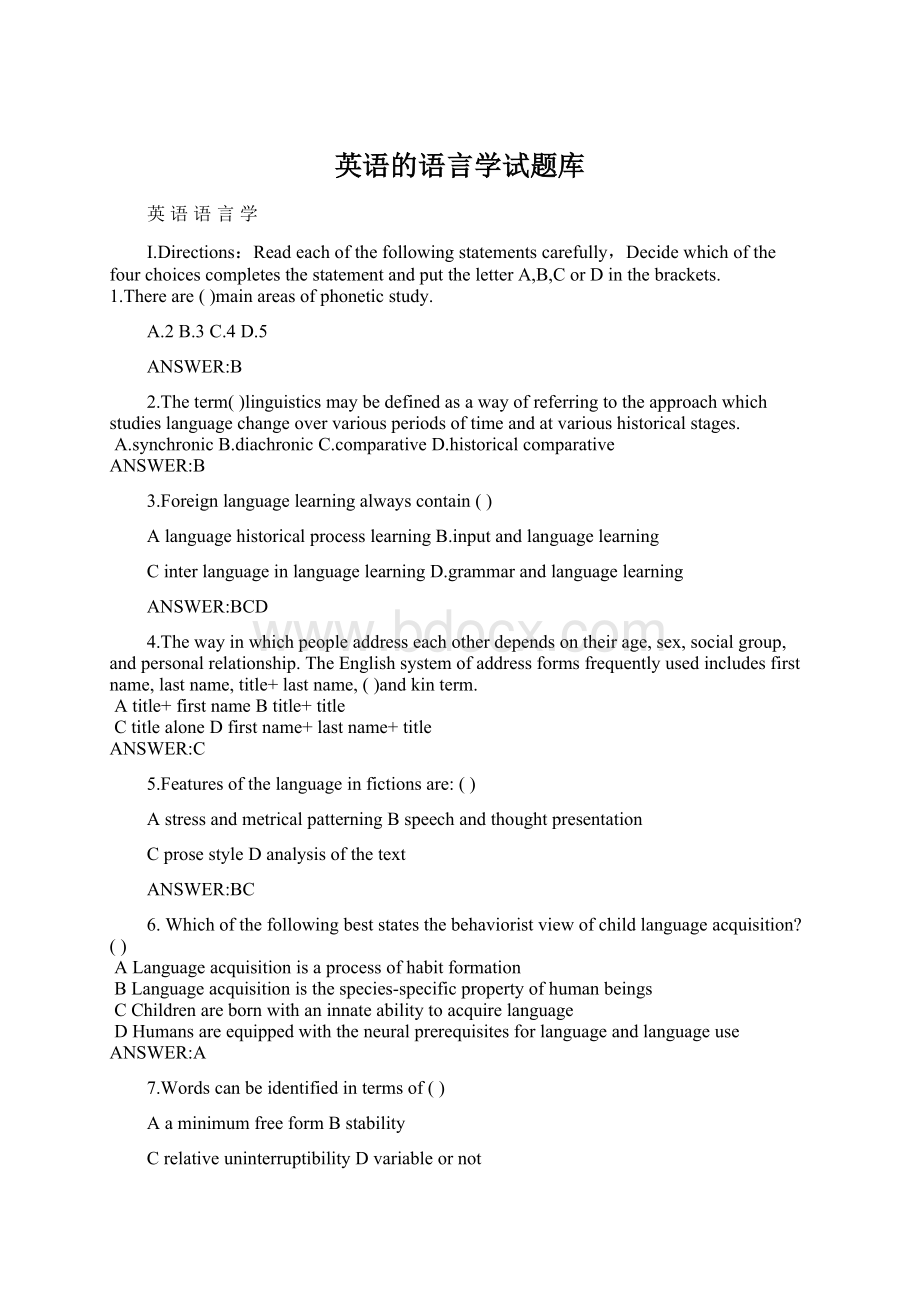英语的语言学试题库.docx
《英语的语言学试题库.docx》由会员分享,可在线阅读,更多相关《英语的语言学试题库.docx(8页珍藏版)》请在冰豆网上搜索。

英语的语言学试题库
英语语言学
Ⅰ.Directions:
Readeachofthefollowingstatementscarefully,DecidewhichofthefourchoicescompletesthestatementandputtheletterA,B,CorDinthebrackets.
1.Thereare()mainareasofphoneticstudy.
A.2B.3C.4D.5
ANSWER:
B
2.Theterm()linguisticsmaybedefinedasawayofreferringtotheapproachwhichstudieslanguagechangeovervariousperiodsoftimeandatvarioushistoricalstages.
A.synchronicB.diachronicC.comparativeD.historicalcomparative
ANSWER:
B
3.Foreignlanguagelearningalwayscontain()
AlanguagehistoricalprocesslearningB.inputandlanguagelearning
CinterlanguageinlanguagelearningD.grammarandlanguagelearning
ANSWER:
BCD
4.Thewayinwhichpeopleaddresseachotherdependsontheirage,sex,socialgroup,andpersonalrelationship.TheEnglishsystemofaddressformsfrequentlyusedincludesfirstname,lastname,title+lastname,()andkinterm.
Atitle+firstnameBtitle+title
CtitlealoneDfirstname+lastname+title
ANSWER:
C
5.Featuresofthelanguageinfictionsare:
()
AstressandmetricalpatterningBspeechandthoughtpresentation
CprosestyleDanalysisofthetext
ANSWER:
BC
6.Whichofthefollowingbeststatesthebehavioristviewofchildlanguageacquisition?
()
ALanguageacquisitionisaprocessofhabitformation
BLanguageacquisitionisthespecies-specificpropertyofhumanbeings
CChildrenarebornwithaninnateabilitytoacquirelanguage
DHumansareequippedwiththeneuralprerequisitesforlanguageandlanguageuse
ANSWER:
A
7.Wordscanbeidentifiedintermsof()
AaminimumfreeformBstability
CrelativeuninterruptibilityDvariableornot
ANSWER:
ABC
8.Whichisnotthefeaturesoflanguage?
()
AarbitrarinessBduality
CcreativityDreplacement
ANSWER:
D
9.Approacherstosyntaxcanbe:
()
AthetraditionalapproachBthestructuralapproach
CthefunctionalapproachDthegenerativeapproach
ANSWER:
ABCD
10.Predicationanalysisisawaytoanalyze()meaning.
AphonemeBwordCphraseDsentence
ANSWER:
D
11.Lexicalchangecannotbearesultof()
AphonologicalchangeBsemanticchange
CanalogicalchangeDorthographicchange
ANSWER:
C
12.Thewordsthatcontainonlyonemorphemearecalled()
AboundmorphemesBrootsCfreemorphemesDaffixes
ANSWER:
B
13.()isthestudyoflanguageinrelationtothemind.
APsycholinguisticsBSociolinguisticsCLinguisticsDSemantics
ANSWER:
A
14.Whichbelongstothemainbranchesoflinguistics?
()
AphoneticsBmetalingyCmorphologyDsyntax
ANSWER:
ACD
15.Whichdoesn’tbelongtothemainbranchesoflinguistics?
()
AphoneticsBmorphologyCmetalingyDsyntax
ANSWER:
C
16.Voicingasaqualityofspeechsoundsiscausedbythevibrationof()
AthevelumBthevocalcordsCtheglottisDtheuvula
ANSWER:
B
17.Senseof“word”contains:
()
AaphysicallydefinableunitBthecommonfactorunderlyingasetofforms
CanessentialformerofsentencesDagrammaticalunit
ANSWER:
ABD
18.Differentfunctionalspeechvarietiesknownasareexpectedin,say,achurchsermon,adiplomaticencounter,afamilydinner,orasportsbroadcast.
AregistersBstylesCdialectsDaccents
ANSWER:
A
19.Whichisnotthefeaturesoflanguage?
()
AarbitrarinessBduality
CcreativityDreplacement
ANSWER:
D
20.Westudypsycholinguisticsbecause()
Atoknowaboutpsychologicalrealityoflinguisticstructures
Btohelptheaphasics
Ctoproducefindingswhichleadtothemodificationoftheoreticalideas
Dtomakeitanewtoolforstudyingpsychology
ANSWER:
AC
Ⅱ.Directions:
Judgewhethereachofthefollowingstatementsistrueorfalse.PutaTfortrueorFforfalseinthebrackets(2%×10=20%).
1.Realationsbetweenmeaningsofwordscanbesynonymy,antonymyorhyponymy.()
ANSWER:
T
2.Bothassimilationandalienationcanhappenduringphonologicalprocesses.()
ANSWER:
T
3.Phoneisaphonologicalunit.()
ANSWER:
F
4.ThedivisionofEnglishintoOldEnglish,MiddleEnglish,andModernEnglishisnonconventionalandnotarbitrary.()
ANSWER:
F
5.ThefirstpragmatictheoryisConversationalImplicature.()
ANSWER:
F
6.FatherofmodernlinguisticsisSwissF.deSaussure.()
ANSWER:
F
7.Inthehistoryofanylanguagethewritingsystemalwayscameintobeingbeforethespokenform.()
ANSWER:
F
8.Thereismerelylittledifferencebetweendataretrievalandinformationretrieval.()
ANSWER:
F
9.Ifachildisdeprivedoflinguisticenvironment,heorsheisunlikelytolearnalanguagesuccessfullylateron.()
ANSWER:
T
10.Thereisnodifferencebetweendataretrievalandinformationretrieval.()
ANSWER:
F
11.Languagereferstotheabstractinnatesystem,however,parolereferstotheoutcomeorwhatweactuallyutter/write.()
ANSWER:
T
12.Therearesomerelationsbetweenlanguageandculture,languageandsociety,buttheyarenotdeservedtospendalotoftimestud